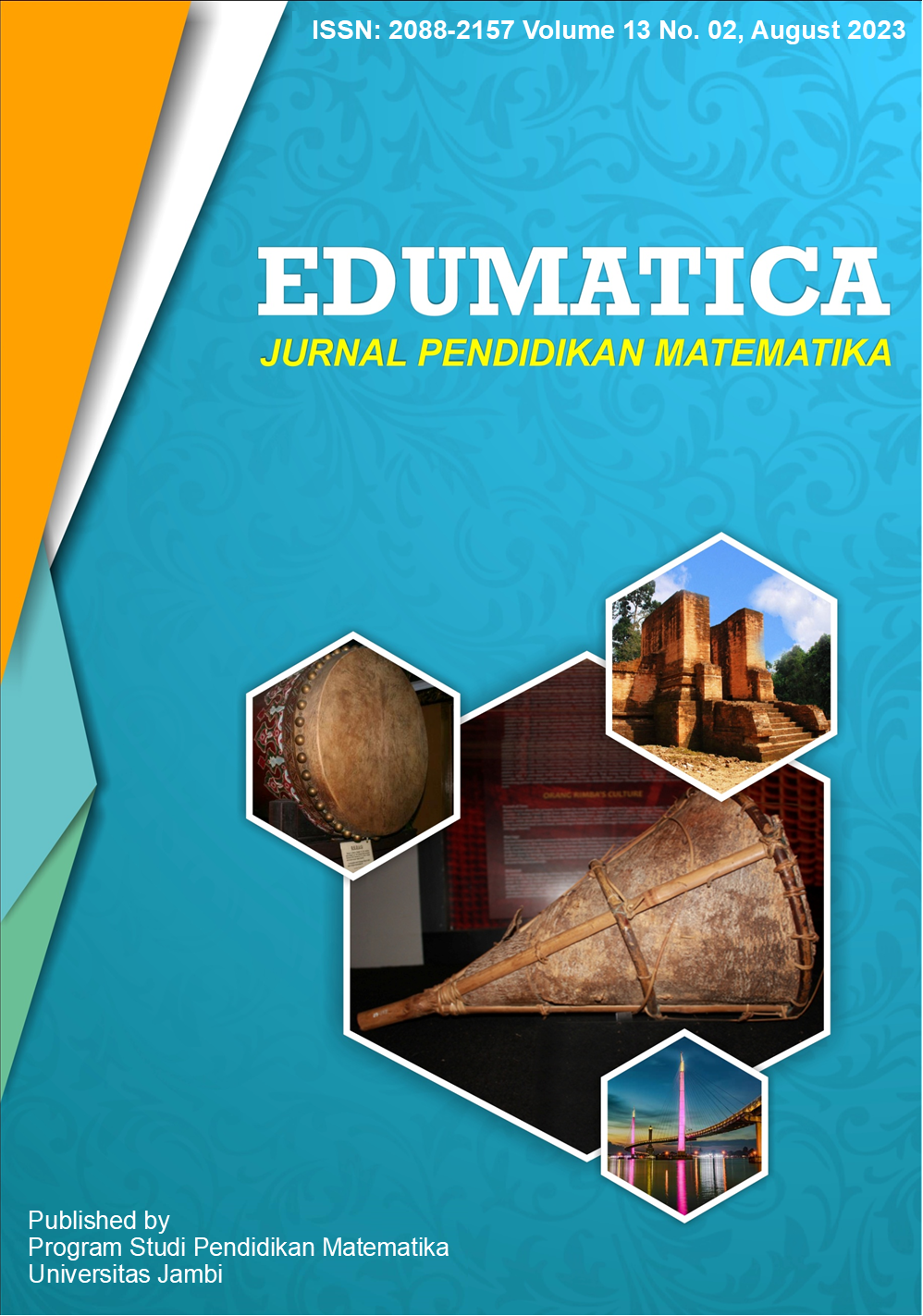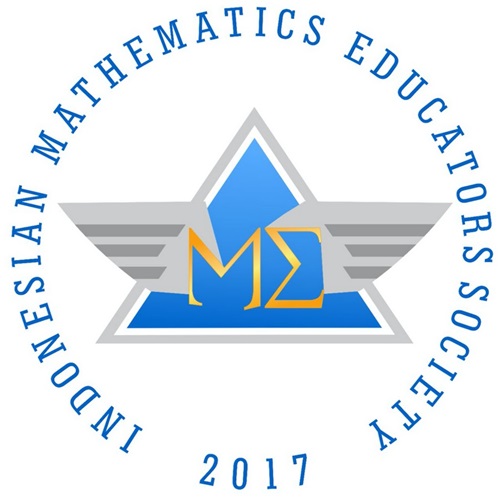Relationship between Self-Confidence and Students' Critical Thinking Skills in Learning: A Case of SMA Negeri 1 Sumberejo
DOI:
https://doi.org/10.22437/edumatica.v13i02.25587Keywords:
critical thinking skills, self-confidenceAbstract
This study aimed to determine the relationship between students' self-confidence and critical thinking skills in the learning process in SMA Negeri 1 Sumberejo. The research participants consisted of 108 students in class XI MIPA SMA Negeri 1 Sumberejo, Tanggamus Regency in the 2021/2022 academic year, which was divided into three classes. Purposive sampling was used to select the research sample. This study used a descriptive correlational design with a correlational study method. The instruments used consisted of a descriptive test to measure critical thinking skills and a self-confidence questionnaire. The data for this study consisted of quantitative data collected by filling out student self-confidence questionnaires and descriptive tests on critical thinking skills on the topic of linear programs as primary data. Data analysis was conducted using the Pearson product-moment correlation test, with a significance level of α = 0.05. The results showed a significant relationship between self-confidence and students' critical thinking skills in learning, with a correlation coefficient of 0.932 and a Sig. (2-tailed) value of 0.000, respectively. This indicates that the higher the students' self-confidence level, the higher their critical thinking skills.
Downloads
References
Arifin, Z. (2016). The Relationship Between Critical and Creative Thinking Skills and Academic Achievement in Mathematics Among Secondary School Students. International Journal of Mathematical Education, 11(3), 45-58.
Arikunto, S. (2018). Prosedur Penelitian: Suatu Pendekatan Praktik. Jakarta: PT. Rineka Cipta. Jakarta.
Brown, A., Johnson, L., & Lee, S. (2020). The Impact of Self-Confidence on Critical Thinking Skills in College Students. Journal of Educational Psychology, 112(3), 456-467.
Depdiknas. (2003). Undang-Undang Republik Indonesia Nomor 20 Tahun 2003 Tentang Sistem Pendidikan Nasional. Jakarta: Sinar Grafika.
Facione, P. A. (1994). Holistic Critical Thinking Scoring Rubric. San Fransisco: California Academia Press, San Fransisco.
Fatmawati, M., Mardiyana, & Triyanto. (2014). Investigating Mathematical Critical Thinking Skills Of Students In Problem-Solving. Journal of Mathematics Education, 7(1), 52-64.
Halpern, D. F. (2014). Thought and Knowledge: An Introduction to Critical Thinking. Psychology Press.
Hapsari, A., & Primastuti, E. (2014). Kepercayaan Diri Mahasiswa Papua Ditinjau Dari Dukungan Teman Sebaya. Psikodimensia, 13(1), 60-72.
Hidayat, A. (2017). The Role of Self-Confidence in Improving Students' Critical Thinking Skills. Journal of Educational Psychology, 5(2), 112-125.
Ismaimuza, D., & Musdalifah, S. (2013). Pengembangan Instrumen Kemampuan Berpikir Kritis Matematis untuk Siswa SMP. Prosiding Seminar Nasional Sains Dan Matematika II, 375-378. Jurusan Pendidikan MIPA FKIP UNTAD.
Johnson, A., Smith, B., & Lee, C. (2021). Investigating Critical Thinking Skills in High School Students. Journal of Adolescent Education, 28(3), 127-141.
Leonard, & Amanah. (2014). Pengaruh Adversity Quotient dan Kemampuan Berpikir Kritis terhadap Prestasi Belajar Matematika. Perspektif Ilmu Pendidikan, 28(1), 55-64.
Noordyana. (2016). Enhancing Students' Mathematical Critical Thinking Through Problem-Based Learning. Journal Of Educational Research and Evaluation, 3(2), 77-88.
Nurpalah, R., & Setyawidianingsih, N. N. (2019). Analisis Kemampuan Berpikir Kritis Matematis dan Kepercayaan Diri Siswa MTs di Kabupaten Bandung Barat. Journal On Education, 1(2), 353-364.
Oxford University Press. (2021). Oxford Advanced Learner's Dictionary. In Oxford Advanced Learner's Dictionary.
Paul, R., & Elder, L. (2019). Critical Thinking: The Nature of Critical and Creative Thought. Journal of Developmental Education, 43(2), 28-29.
Rahayu, M. (2013). Self-Confidence and Its Impact on Students' Learning Outcomes. International Journal of Education and Research, 1(8), 1-12.
Rosita, D. (2017). Enhancing Critical Thinking Through Self-Confidence Development. Journal of Thinking Skills and Creativity, 8(1), 32-45.
Smith, R., & Johnson, M. (2018). Self-Confidence and Critical Thinking Skills Among High School Students. Journal of Adolescent Education, 25(2), 178-193.
Sofiana. (2008). Peningkatan Kepercayaan Diri Pada Siswa Dalam Pembelajaran Matematika Memalui Pendekatan Visual Auditorial Kinestetik.
Sudijono, A. (2013). Pegantar Evaluasi Pendidikan. Jakarta: Raja Grafindo Persada.
Thompson, R., & Roberts, K. (2019). The Relationship Between Critical Thinking Skills and Academic Performance in College Students. Journal of Educational Psychology, 114(5), 589-602.
Wahyuni, S. (2014). Hubungan antara Kepercayaan Diri dengan Kecemasan Berbicara di Depan Umum pada Mahasiswa BPI. Ejournal Psikologi, 2.
Yates, P. (2002). The Role of Self-Confidence in Learning Mathematics: A Case Study. Journal of Mathematics Education, 4(2), 75-86.
Downloads
Published
How to Cite
Issue
Section
License
Copyright (c) 2023 Rizki Mei Safitri, Sugeng Sutiarso

This work is licensed under a Creative Commons Attribution-NonCommercial-ShareAlike 4.0 International License.







